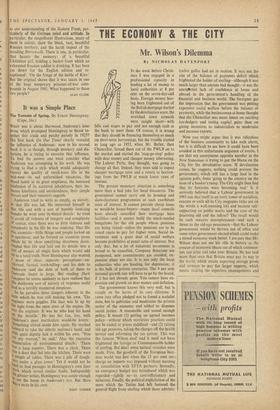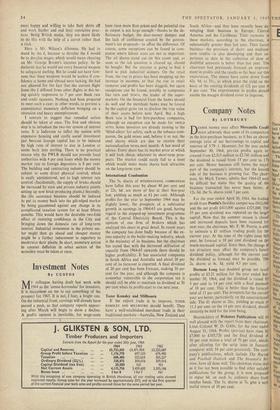THE ECONOMY & THE CITY
Mr. Wilson's Dilemma
By NICHOLAS DAVENPORT
IN the week before Christ- mas I was engaged in a professional capacity in lending a lot of money to local authorities at 8 per cent on the seven-day-call basis. Foreign money hav- ing been frightened out of the British mortgage market by the devaluation scare, the wretched town councils were caught short—with bills and wages to pay and not enough cash at the bank to meet them. Of course, it is wrong that they should be financing themselves so much on short-term borrowings, but the trouble started as long ago as 1955, when Mr. Butler, then Chancellor, forced them out 'of the PWLB on to the market and started the 'stop-go-stop' policy with dear money and cheaper money alternating. The Labour Party, they thought, was going to change all that. Indeed, they were told to expect cheaper mortgage rates and a return to borrow- ings from the PWLB at much lower rates of interest.
The present monetary situation is something more than a bad joke for local treasurers. The government cannot carry out its housing and slum-clearance programmes at such exorbitant rates of interest. It cannot provide cheap loans to would-be house-buyers--many local councils have already cancelled their mortgage loan facilities—and it cannot build the much-needed bungalows for the old people whose pensions are being raised—unless the pensions are to be raised again to pay for higher rents. Social in- vestment and a great deal of social welfare become prohibitive at penal rates of interest. Not only that, but a lot of industrial investment is bound to be cancelled.. Company flotations are postponed, new commitments are avoided, ex- pansion plans are cut. It is not only the local authorities who are heading for depression; it is the bulk of private enterprise. The 4 per cent national growth rate will have to go by the board, if it has not already gone. You cannot have ex- pansion and growth on dear money and deflation.
The government knows this very well, but is caught on the horns of its own dilemma. It came into office pledged not to found a socialist state, but to galvanise and modernise the private sector of the economy and withal to dispense social justice. A reasonable and sound enough policy. It meant (1) getting an agreed incomes policy--without which restrictive practices could not be ended or prices stabilised—and (2) raising old age pensions, taking the charges off the health service and reforming the tax system. This was the famous 'Wilson deal' and it need not have frightened the foreign or Commonwealth holder of sterling. But alas! some tactical mistakes were made. First, the goodwill of the European busi- ness world was lost when the 15 per cent sur-, charge on imports was imposed without warning or consultation with EFTA partners. Secondly, an emergency budget was introduced which was regarded—rightly so—as cost-inflationary and minatory. Finally, the political exploitation of the mess which the Tories had left fostered the general flight from sterling which these adminis-
trative gaffes had set in motion. It was not the size of the balance of payments deficit which frightened the holder of sterling—although it was much larger than anyone had thought—it was the unexpected lack of confidence at home and abroad in the government's handling of the financial and business world. The foreigner got the impression that the government was putting expensive social welfare before the balance of payments, while the businessman at home thought that the Chancellor was more intent on catching tax-dodgers and taxing capital gains than on giving incentives to industrialists to modernise and increase exports.
Now you might argue that it was ridiculous of the business community to take such alarm, but it is difficult to see how it could have been avoided in this unfortunate sequence of events. I see that my anonymous opposite number in the New Statesman is trying to put the blame on the City for the devaluation scare. If devaluation comes, he suggests, nothing could prevent the government, which still has a large lead in the opinion polls, from 'going to the country on the issue of a banker's ramp. The City might then find that its fantasies were becoming real.' Is it seriously believed that a Labour government in 1965 can shut itself in an ivory tower of socialism, execute or exile all its City magnates (who are on - the whole a well-meaning lot) and become self- supporting on public works and the care of the deserving old and the infirm? The result would be such massive unemployment—and such a threat to the old-age pensioners—that the Labour government would be thrown out of office and some other government elected which could make a mixed economy work better. I am sure that Mr. Wilson does not see his role in history as the creator of economic chaos out of which commun- ism can arise and take over Britain. He has said more than once that Britain must pay its way in the world, which means exporting enough goods and services to pay for larger imports, which means making the exporters (managements and
men) happy and willing to take their shirts off and work harder and end their restrictive prac- tices. Being British mules, they are more likely to do this with the help of a carrot rather than a stick.
Here is Mr. Wilson's dilemma. He had to stand by the £, because to devalue the £ would be to devalue wages, which would mean cheating on Mr. George Brown's incomes policy. So he declared that he would use every financial weapon to safeguard sterling. But he could not have fore- seen that these weapons would be useless if con- • fidence at home and abroad were lacking. He had not allowed for the fact that the current flight from the £ differed from other flights in riot be- ing quickly responsive to 7 per cent Bank rate and credit squeezes. Nothing had been prepared to meet such a case; in other words, to prevent a conventional monetary deflation bringing on a recession and heavy unemployment.
I venture to suggest that remedial action should be taken at once. The first and obvious step is to introduce the two-tier system of interest rates. It is ludicrous to inflict the nation with expensive housing and costly social investment just because foreign capital has to be induced by high rates of interest to stay in London or come back into sterling. There is no practical reason why the PWLB should not provide local authorities with 4 per cent loans while the money market rate to foreign depositors is 8 per cent. The building and contracting industry should be subject to some direct physical control, which is easily administered, not to high interest rate control. (Incidentally, the supply of bricks should be increased by state and private industry jointly setting up new brick-producing plants.) Secondly, the life , assurance business should be induced to put its money back into the gilt-edged market by being guaranteed against any change in its complicated taxation system for at least fifteen months. This would have the desirable two-fold effect of restoring confidence in the City and bringing down the domestic rate of long-term interest. Industrial investment in the private sec- tor might then go ahead and cheaper money might be a further inducement to exporters to modernise their plants. In short, monetary action to counter deflation in select sectors of the economy must be taken at once.































 Previous page
Previous page